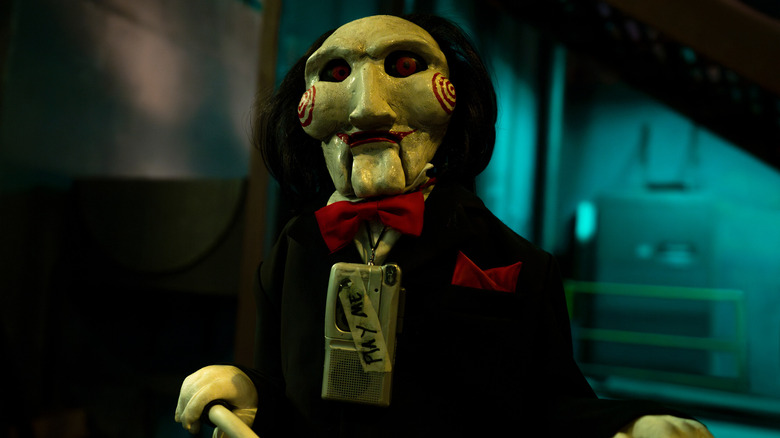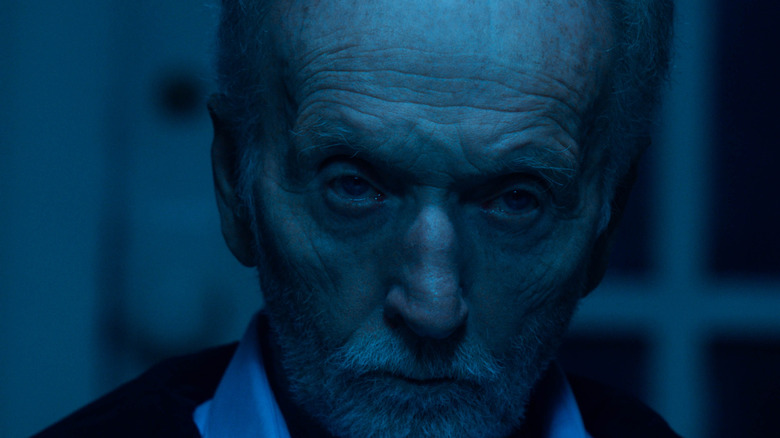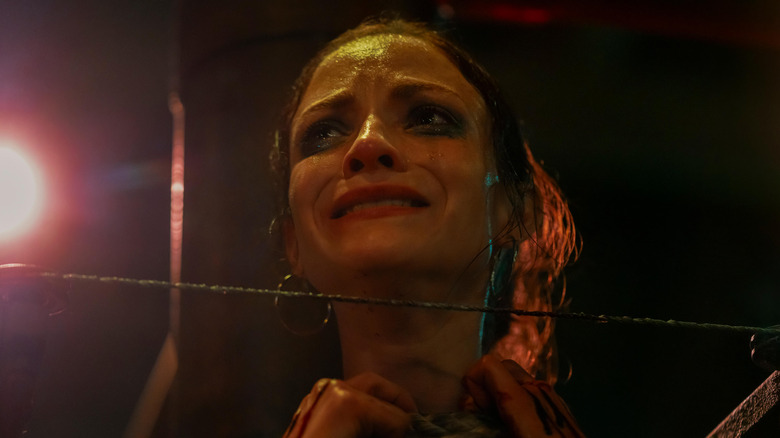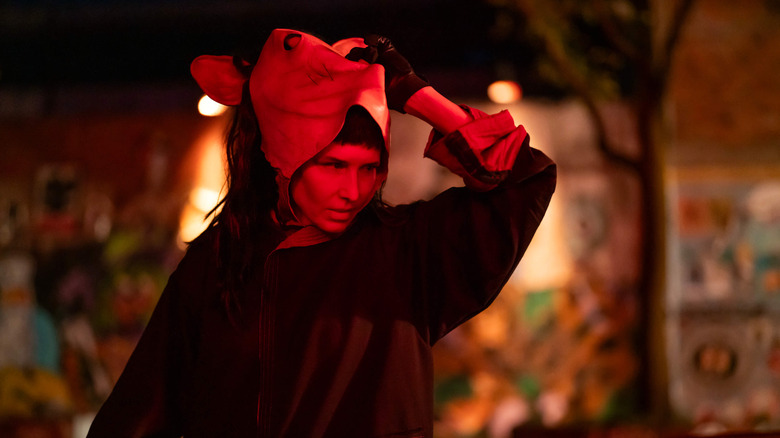Saw X Composer Charlie Clouser On Providing Jigsaw's Deadly Soundtrack For Nearly 20 Years [Exclusive Interview]
It is a very tough thing to keep a franchise going for nearly 20 years. But "Saw" has done precisely that, with the series now coming up on its tenth entry since 2004 as "Saw X" makes its way to theaters. Against all odds — and in spite of the fact that John Kramer died canonically during the events of "Saw III" — Jigsaw is once again back for more. Also back for more is composer Charlie Clouser, who has scored the soundtrack for every single film in the series thus far. And he intends to stick with it for as long as Jigsaw wants to continue playing games with his victims.
"Saw X" brings back franchise vet Kevin Greutert, of "Saw VI" fame, who returns to the director's chair for the first time since 2010's "Saw 3D." Though it is the tenth entry in the series, this movie is actually a prequel that takes place between "Saw" and "Saw II." It centers on a sick and desperate John Kramer who travels to Mexico for a risky and experimental medical procedure hoping to find a miracle cure for his cancer. He soon discovers the whole operation is a scam to defraud the vulnerable. Armed with a newfound purpose, John turns the tables on the con artists by putting them through a series of live-or-die games.
I had the good fortune of speaking with Clouser in honor of the film's forthcoming release. We discussed the franchise record he's setting with "Saw X," how he got into the movie business in the first place, how his work with bands like Nine Inch Nails and Rob Zombie helped him in his work composing for movies and TV shows, and much more.
Note: This interview has been lightly edited for clarity and brevity.
'You can't make a Saw movie without some of these pieces of music'
Charlie, first off, thank you so much for doing this. I should mention that my first love is music. Right beside me is a Rob Zombie CD and a Nine Inch Nails CD. So just so you know, I'm very, very thrilled to be talking to you, man.
Let's see, which Rob Zombie? Is it this one [points to a gold record on the wall].
That is exactly the one.
Which Nine Inch Nails? Is it that one or is it that one [points to more gold records on the wall]?
Oh my God, that's so cool.
Those had been wrapped up in plastic and sitting in a storage closet for years and years and years. My wife is like, "Why don't you hang these up?" And I was like, "Okay, get me the tape measure and the ruler and I'll see if I can hang them in a straight line."
The PR people, they'll send these emails out, they'll be like, "You want to speak to this person?" They try to make it sound as cool as possible. I've got to tell you, the email they sent me had a pretty good hook to it. You apparently hold the record for doing the most movies in a single franchise, dethroning Mr. John Williams for "Star Wars." So how does that feel?
Well, one caveat is Jordan from the PR company had done some deep digging and he found a composer who had scored like 22 films in a series called "Carry On," which is a British film series. I know nothing about them, but apparently they've been running for decades. I'm not completely at the top of the pile, but let's just say for American composers or American films, that'll be our little footnote.
Sure thing.
It's pretty amazing that the music for the "Saw" franchise has become sort of a character in the films. As actors, directors, and writers have come and gone in the franchise, somehow the music that I wrote for the first one had become sort of almost like Tobin Bell's character. You can't make a "Saw" movie without some of these pieces of music. So I feel dang lucky that the way this franchise shaped up, is that the music has become kind of an indispensable part of what makes it a "Saw" movie. It wasn't planned that way, but I feel pretty lucky that's become the case. Certainly, I can't put myself on John Williams' level in any respect except for the sheer number of movies that we've scored within a single franchise.
So we're not going to put the headline as, "Take that, John Williams."
Right.
Obviously I was familiar with you from music, but I did not realize how much film and TV work you had done. What was the original plan? Was music your first thing and then did you just kind of fall into the movie and TV stuff?
My first ambition was to make cool-sounding records after growing up on Led Zeppelin and Pink Floyd. Then in college, discovering the revolution in music with bands like Gang of Four, Talking Heads, and Devo, that kind of kicked down the door. When you're a kid learning to play drums and you listen to a Led Zeppelin record, and then you record some drums, you think, "Well, there's a huge distance between what I'm able to do and what these records that I love sound like." It was all just a mystery. So I always wanted to be involved in making those kinds of records, but I also knew that there was a wider world of sonic experimentation out there.
I didn't set out to be a virtuoso on any instrument. I just liked the sonic collage aspect of so many of those sorts of artsy records, like Talking Heads' "Remain in Light." A very influential record for me was the David Byrne and Brian Eno record called "My Life in the Bush of Ghosts," which was mostly instrumental and quite a sonic collage with sampled preachers from TV broadcasts and weird bits of ethnic music mixed in with freshly recorded material. So I was always interested in that sonic frontier. As time went by, I realized that there might be opportunities to use some of that style in the film music context.
One of the first jobs I ever had being paid to make music was working underneath a composer on the score for the original CBS TV series "The Equalizer" back in the 1980s. This composer was a former record producer from Australia named Cameron Allen, and he had produced a bunch of records that were on that fringe of quasi-art rock kind of stuff. He had actually been a customer of mine at the only job I ever held, which was working at the Sam Ash Music store on 48th Street in Manhattan as the computer software guy, right as computer software for music appeared on the scene in like 1985. He hired me out of the store to come and do sound design, synth programming, and drum programming for his TV score. That was a great way to see that some of the skills that I had that applied to the record world could also apply in the scoring world. I worked with him for a few years and then did a 15-year detour into making records.
But after I left Nine Inch Nails in 2001 and wanted to move more into scoring, I already had some experience in how the sausage gets made. I wasn't strictly a refugee from a band, but I already had worked on a weekly TV series and I knew the workflow, and the terminology, and the musical techniques behind churning out that much music every week. So to me, it's all part of the same soup. Nine Inch Nails music leans more towards the kind of criteria that you use in scoring than you might in a rock song. The form and the structure of Nine Inch Nails songs is not strictly verse, chorus, or guitar solo. That was very appealing to me, and that's part of the reason why I wanted to work with Trent [Reznor] on those records. Also, it's very sound design-heavy from a musical standpoint. You're creating new and interesting sounds, whether you're manipulating samples or working with synthesizers.
So a lot of what I wound up doing on the record side of things did apply to the scoring side. When you add all of those 15 years to my earlier minor experience with scoring, then it was kind of a natural transition when the time came.
'So much of the story is really centered around John Kramer as opposed to the victims'
Going back to "Saw X," I haven't seen the movie yet, but it appears very much like John Kramer is sort of the main character in this one, which is kind of a unique thing. So what was it like sort of scoring for him as a main character rather than a supporting villain?
In "Saw X," so much of the story is really centered around John Kramer as opposed to the victims, quote-unquote, and the whole first third of the movie really follows him as he's seeking out this experimental cure for his brain cancer and traveling to Mexico to get this experimental treatment. And of course, then it all goes horribly wrong, both for him and for the victims. But the whole first third of the movie from a musical standpoint, is fairly out of character compared to other "Saw" movies. It was about scoring his desperation first as he receives a diagnosis, then the tentative hope as he thinks he may have found a solution.
So there was this path of following that emotional arc as his character goes through that in the first third of the movie. There's moments of tender, hopeful, gentle music that still needed to relate to his character and to many of the other musical moments throughout the franchise that have related to him. But it was a pleasure to see Tobin Bell's character, John Kramer, have so much more screen time than in many of the earlier movies. Sometimes in earlier movies, he's just a disembodied voice over a loudspeaker or a face appearing on a computer monitor. And of course, Tobin's performance in all the movies as the Jigsaw John Kramer character is riveting in his pacing and his delivery. It was great to be able to score the full gamut of human emotions behind that character.
So how did it feel going from "Spiral," which was very much, "We're going to try to depart, we're trying to do something very different," to "Saw X," which is very much like, "Let's give the people what they want"? That feels like the most jarring move between two movies in the franchise, if you ask me.
It was a lot of fun to do "Spiral" because I think of that movie as sort of a side street off of the main avenue of the "Saw" franchise storyline. Because they were introducing new characters like Chris Rock and Sam Jackson's characters, and a lot of the movie takes place almost as a police detective thriller. It was great to be able to expand on the sonic footprint through "Spiral" and to score those more action movie and thriller-type sequences.
Then moving on to "Saw X," there was yet another little detour as I had to score John Kramer's emotional journey in the first third of the movie before dropping back into familiar "Saw" territory for the back half of the film. In my mind, it was almost that "Saw X" is joined at the hip to the earlier movies, 1 through 8, and that "Spiral" was a brief detour from a musical style standpoint. It was almost as though we hit a red light, so we took a trip around the block and now we're back on the main avenue of "Saw."
I talked to [director] Darren [Lynn Bousman] for "Spiral," and that's very much how he described it as well. It was funny, I mentioned I was talking to you in my work Slack, and my buddy Bill said he was actually just listening to the "Saw V" commentary and he said there's a moment where they're watching the hand trap scene. You actually had to turn away from the screen and smoke a cigarette. Apparently, that was how you just started dealing with "Saw." Has that changed at all for you?
The one advantage I have when scoring the "Saw" films is that sometimes some of the VFX are not completed and present in the cut that I'm scoring. So for instance, in the movie "Jigsaw," at the very end, instead of seeing one of the characters with his arm severed, I get to watch a guy wearing a fluorescent green glove over his arm because they're going to digitally put in the severed arm later. That makes my job just a little bit easier on a weak stomach.
But to that point, you've done a lot of horror stuff. Did you love horror movies before this, or did you just kind of find yourself in this genre?
I was never a horror movie aficionado or authority like so many of the directors that I've worked with — James Wan, Leigh Whannell, and Marcus Dunstan, who was involved in the "Saw" franchise. I've scored a couple of other movies that he directed. So many of these guys are deep to the genre and can pull out references that I may have to research. Because I may not be all that familiar with, for instance, the Italian progressive band Goblin and their score to "Suspiria," which is frequently used as a touchstone and a reference point when talking about the scores to these kinds of movies. So sometimes I'll have to dig it out of the crates and listen to it just to remind myself of what we're referencing here.
But my natural tendencies towards the way I like to put music together and the type of sounds I like to use is sort of a natural fit for horror movies, and that doesn't bother me one bit. I think to some degree, the fact that I'm not as steeped in the genre as some folks are, at least won't result in me staying in the horror movie lane as much as might be likely if I was a complete devotee and con attender. I can kind of temper what I'm doing musically in the horror genre with my other influences that come from espionage thrillers or science fiction movies.
'There are some sonic molecules that I always feel can only be used in a Saw movie'
Also, you mentioned James Wan, and I just have to say you did "Dead Silence," which I think is a wildly underrated movie. I absolutely love "Dead Silence." My very first Redbox movie, oddly, was "Dead Silence." Way back in the day, it was my best friend, the weird place that holds in my personal history. You worked with a lot of shockingly great directors and you worked with M. Night Shyamalan, if I'm not mistaken, on "Wayward Pines." What was it like working with him? Because he feels like a very specific guy. He feels like someone who has a very specific vision.
The scores to most of M. Night's movies, I know that James Newton Howard has done a lot, if not most, and maybe all of them. That's very rich and orchestral, and a very tactile kind of approach. "Wayward Pines," it's funny, even though it's technically a science fiction tale with elements of time travel and zombie apocalypse elements to the storyline, as we were beginning the process, I was only shown the very first episode, and began scoring the first episode without having read the books and knowing the larger arc of the story. Which, as it turned out, was a smart choice on their part, to throw me in cold, because there was a bit of a misdirect for the audience in the way that the story progresses. In the first episode, we sort of think it might be a "Twin Peaks" kind of story, where there's this weird little mountain town and everybody's in on something, but you don't quite know what it is.
[Massive spoilers for "Wayward Pines" ahead.]
As the series progressed and we moved through the episodes, it's revealed that it's thousands of years in the future and mankind has mutated into these quasi-human beings, and this little mountain town is sort of the last walled refuge of humankind. It was kind of a smart choice on the part of the producers to just drop that one episode in my lap and let me score that as if that was the direction that the series was going to go. Then once the twist is revealed, it opens up this much more epic large-scale zombie apocalypse kind of soundscape in the music. But that first episode, I scored it as if it was just this claustrophobic, weird little mountain town and people are playing mind games with each other. So it was really fun that I was misdirected in the same way that the audience was.
As the series progressed, I was able to add more large-scale, epic sounds and themes into the score, and that was a nice path to go down because I was going down it much as the audience would, with a misdirection at the beginning and then a twist reveal.
You scored what I thought was the most interesting episode of "Fear Itself" [titled "New Years Day"], which Darren directed, which was that very fascinating take on a zombie story. You don't really know what's going on until the very end. You mentioned you're not steeped in horror. So how did that impact your approach to scoring a zombie film?
I try to follow the arc of the story and not give away the twist by means of the music. If that means that the front half of the score has different sounds and a more constrained feeling before some sort of sonic explosion, and expansion of the sound and size of the score when that twist ending is revealed. I love that aspect of movies with a twist that don't just start off at full tilt and stay that way, but might start off small and let the music almost be a misdirection, much like the story is, until the horrible truth is eventually revealed.
You've done 10 "Saw" movies now. That's a lot of one thing, but a lot of the movies are very different. We talked about going from "Spiral" to "Saw X," but is there an essential element to "Saw" music? A key ingredient?
There are some elements in the score for all of the "Saw" movies that I subconsciously feel like they have to be there. Whether it's a particular sound, like the sound of a violin bow on this bow metal instrument that I have or whatever. So there are some sonic molecules that I always feel can only be used in a "Saw" movie that I don't use anywhere else, in any other type of scoring project. But there are also some musical tendencies besides the obvious "Hello Zepp" theme that appears at the end of each movie, and some of the other more memorable little musical motifs that are sprinkled throughout and refer to certain characters or certain phases within the franchise.
There are other more philosophical musical approaches that I always use in "Saw" movies. For instance, one tendency I have is that all the chord progressions and where the root node is, where your left hand is on the keyboard, is always moving downwards and never upwards so that it sounds like the music is always transposing down, and dragging the characters and the audience down into some dismal pit. I do that just because it seems to make philosophical sense. But the side effect of that is that it allows for a huge contrast in those two or three moments when I then reverse direction and begin moving upwards across the scale.
That can have the effect of making those moments much more impactful because we've been waist deep in the murk that's always moving downwards and things are just getting lower and lower in pitch throughout the entire score until, at some point, it's like a switch gets flipped and the music starts moving upwards and it creates a very marked contrast. Those kinds of little philosophical game plans really help to shape the overall arc of the scores of most of the movies. I would also like to think they help to make those scores sound a little different to maybe more thematic and melodically-oriented horror scores in other films.
This is "Saw 10." We know how this business goes. If it makes money, it doesn't matter, they're going to find a way to do another one. Is this the last one for you? Or if they call you for "Saw 15," are you going to do it?
I will do them all. They're going to have to pry the "Saw" franchise from my cold dead hands. I love doing them and I by no means feel like I've exhausted the possibilities, so I'm anxiously awaiting to see what they come up with next, and I'm 100% on board.
"Saw X" hits theaters on September 29, 2023.



